I’ll never forget the first time I tried to read the Old Testament as an adult. I opened to Genesis, full of good intentions, and by the time I hit the genealogies in chapter 5, I was completely lost. Names I couldn’t pronounce, customs I didn’t understand, and stories that seemed to have nothing to do with my Monday morning commute or weekend grocery runs.
Here’s the thing though – you don’t need to wade through all 23,145 verses (yes, that’s actually how many there are) to find the stories that’ll knock your socks off. Some of these narratives will hit you right in the gut, while others might leave you scratching your head. But the best ones? They’ll make you see your own life completely differently.
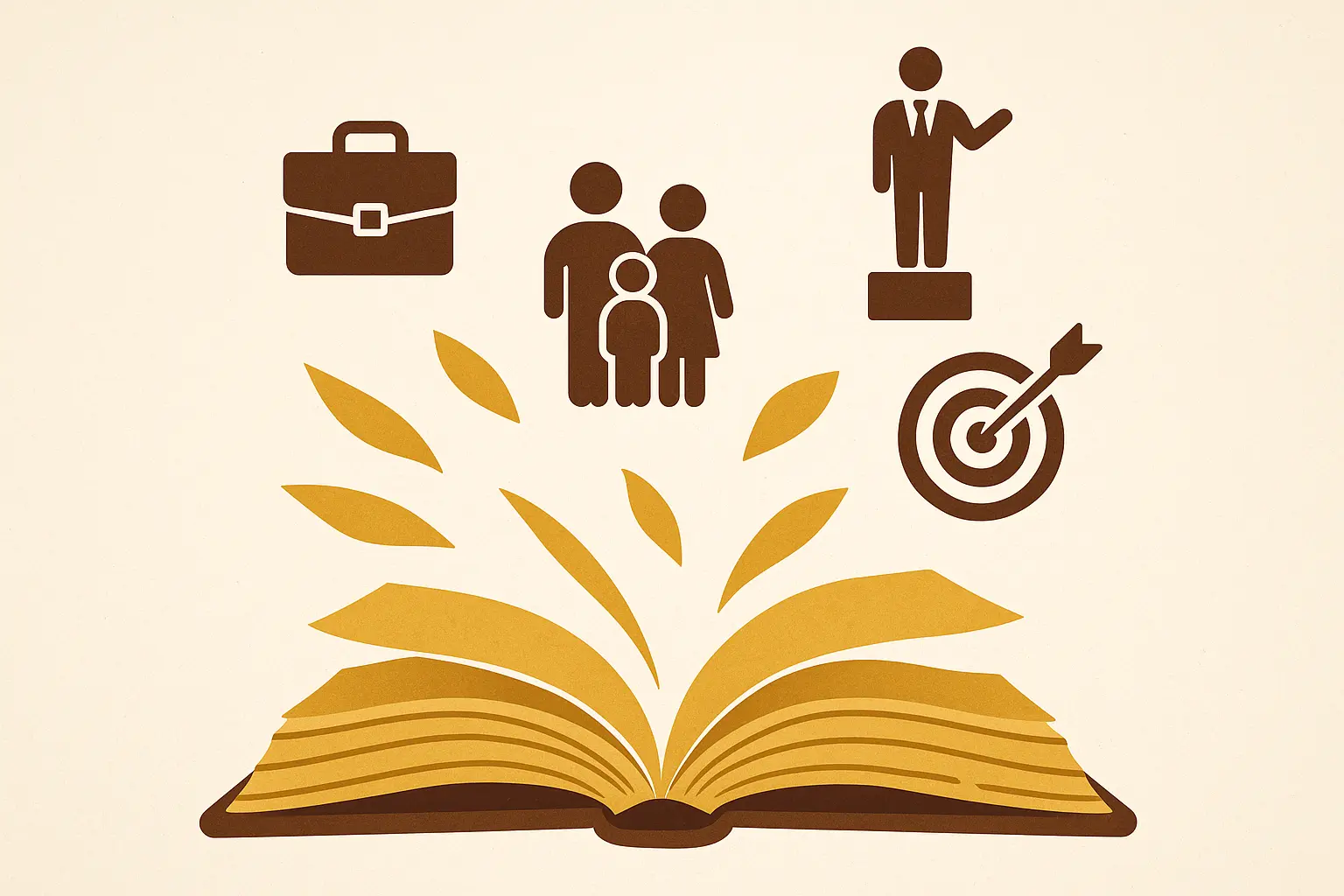
Table of Contents
-
How to Choose the Right Old Testament Stories for Your Needs
-
Origins and Foundations: The Stories That Started It All
-
Patriarchs and Promises: Faith in Action
-
Liberation and Law: Freedom and Responsibility
-
Conquest and Judges: Leadership Under Pressure
-
Kings and Prophets: Power and Accountability
-
Exile and Restoration: Hope in Dark Times
-
Simple Stories vs. Complex Narratives: What Works When
-
Real-World Applications for Modern Life
-
Final Thoughts
TL;DR
-
25 essential Old Testament stories span six major categories, from creation to restoration
-
Stories range from simple moral lessons (perfect for quick inspiration) to complex multi-layered narratives (great for deep thinking)
-
Pick stories based on what you need: immediate help, long-term growth, or group discussion material
-
High-relevance stories like David and Bathsheba read like today’s headlines about power and accountability
-
Some stories work great on their own, while others need background context to make sense
-
These ancient stories tackle the same stuff we deal with today: leadership, forgiveness, courage, and transformation
-
Modern applications range from workplace integrity to family conflict resolution
How to Choose the Right Old Testament Stories for Your Needs
Look, choosing which Old Testament stories to dive into isn’t rocket science, but it’s not random either. You wouldn’t pick the same Netflix show for a quick lunch break as you would for a weekend binge session, right? Same principle applies here.
Start with what’s bugging you right now. If you’re dealing with a workplace situation where someone’s abusing their power, David and Bathsheba’s story is going to hit different than if you’re just looking for general inspiration. That story reads like every #MeToo headline you’ve ever seen – powerful guy sees what he wants, takes it, then tries to cover it up when things go sideways.
You know that moment when your boss asks you to fudge the numbers just a little bit, and you feel your stomach drop? That’s your Daniel moment right there. His story about staying true to his values when the system was rigged against him speaks directly to anyone who’s ever had to choose between their paycheck and their principles.
Understanding different story theme examples can actually help you figure out which Old Testament accounts will resonate most with whatever you’re going through right now.
Here’s how I figure out which stories to dig into:
If you need quick help with something specific – go for David and Goliath or Daniel in the lion’s den. These are like spiritual energy drinks – immediate boost, clear message, ready to apply to your situation today.
If you’ve got time to really think – tackle Abraham and Isaac or Joseph’s whole saga. These are more like a good therapy session – messy, complicated, but you’ll walk away changed.
If you’re teaching kids or newbies – stick with the simple ones. Nobody needs to start with Jacob wrestling mysterious strangers at 2 AM.
Does the story make sense on its own? Some stories work perfectly as standalone episodes (David and Goliath – underdog wins, boom, done). Others are like jumping into the middle of a TV series – you’ll be lost without the backstory. Joseph’s journey with his brothers spans multiple chapters and generations, but if you stick with it, you’ll get insights into forgiveness and how life has this weird way of working out that you just can’t get from a quick read.
How complicated do you want to get? Abraham’s willingness to sacrifice Isaac operates on about five different levels – literal story, theological symbolism, psychological exploration of faith, ethical questions about right and wrong, and probably a few more I’m missing. That complexity makes it fascinating if you’re into that kind of deep dive, but it might leave you more confused than when you started if you’re just looking for straightforward guidance.
Think about it this way: if you’re running a team meeting about workplace ethics violations, David and Bathsheba gives you immediate, relevant material with clear parallels to modern power abuse scandals. The story is self-contained, offers multiple discussion points about accountability, and directly applies to contemporary leadership challenges. But Abraham’s near-sacrifice of Isaac? That’s going to confuse people and probably derail your meeting into a theological debate about divine commands versus moral intuition.
Universal stuff always works. Stories that dig into fundamental human experiences – jealousy, competition, forgiveness, standing up for what’s right, family drama – work across different backgrounds and experiences. Cain and Abel’s sibling rivalry hits home because we’ve all felt that flash of “Why does everyone like them better?” (Though hopefully none of us took it as far as Cain did.)
Cultural impact matters too. The phrase “David vs. Goliath” is universally understood as representing an underdog facing overwhelming odds. Everyone gets that reference, which makes it immediately accessible whether you’re talking to church folks or complete skeptics.
Origins and Foundations: The Stories That Started It All
These opening stories don’t just tell us how things began – they show us patterns of human behavior that keep repeating throughout history. And honestly? You’ll recognize yourself in every single one of them.
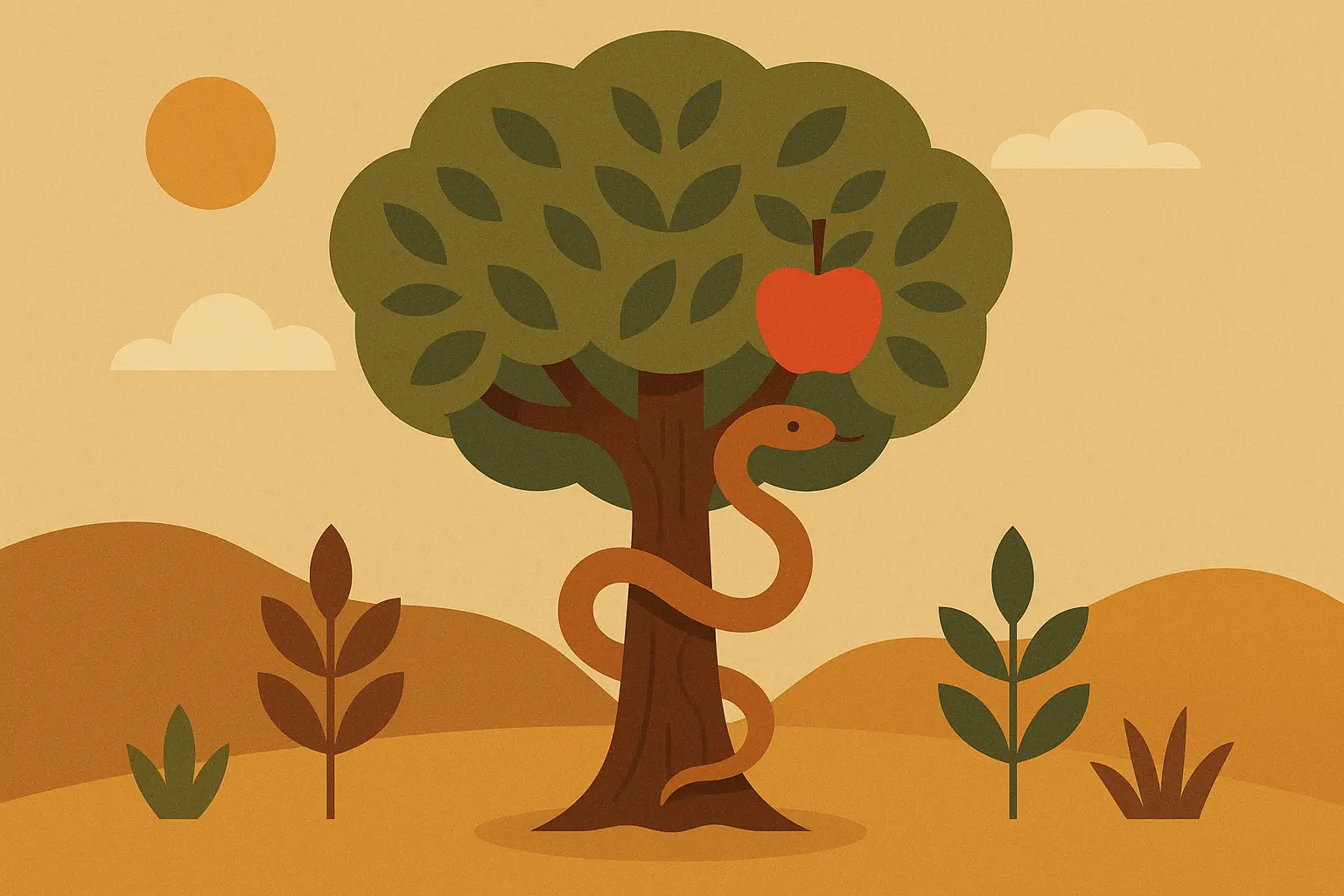
1. The Creation (Genesis 1-2)
The creation story hits different when you realize it’s not just about how the world got here – it’s about your identity and purpose. You’re not some cosmic accident or random collection of atoms that happened to develop consciousness. You’re a deliberate creation with inherent dignity and specific responsibilities.
What really gets me about this story is the work-rest rhythm. Even God took a day off! If the creator of the universe can hit pause, maybe we can stop feeling guilty about not being productive 24/7. The story also tackles environmental responsibility (you’re supposed to care for creation, not exploit it) and human dignity (every person has value regardless of their status or bank account).
2. The Fall (Genesis 3)
Ever notice how the stuff you’re not supposed to do suddenly becomes incredibly appealing? Adam and Eve had literally everything – perfect garden, perfect relationship, perfect life – and they still went for the one thing that was off-limits. If that doesn’t sum up human nature, I don’t know what does.
You’ll recognize the patterns here in your own life: temptation that seems totally reasonable at the time, rationalizing questionable choices, blame-shifting when consequences show up (“The woman you gave me…” – classic move, Adam), and that awful shame that follows moral failure. The story doesn’t just explain why the world is messed up – it shows how our personal choices ripple out way beyond what we expect.
3. Cain and Abel (Genesis 4)
Honestly, the Cain and Abel thing hits different when you have siblings. We’ve all felt that burning jealousy when it seems like everyone likes our brother or sister better. But murder? Dude took it way too far.
This story speaks directly to workplace competition (think about the last time someone got the promotion you wanted), family favoritism that parents swear doesn’t exist but totally does, and the danger of constantly comparing your success to others. Cain’s question “Am I my brother’s keeper?” still comes up in every discussion about social responsibility and community obligation. The story also shows how unaddressed anger and resentment can lead to devastating consequences – a lesson we could all use.
4. Noah’s Ark (Genesis 6-9)
Noah’s story is about way more than animals on a boat. This guy spent years building an ark with no sign of rain, enduring mockery from neighbors who thought he’d lost his mind. Talk about standing alone when everyone else thinks you’re wrong.
I think about Noah every time someone talks about climate change preparation, or when financial experts recommend having an emergency fund, or when you have to maintain your values while popular culture moves in a completely different direction. The story also explores second chances (hello, rainbow covenant) and starting over after everything you knew got wiped out.
5. The Tower of Babel (Genesis 11)
The Tower of Babel story always makes me think about those tech billionaires who think they can solve everything with an app. Same energy, different century. The builders wanted to create something so impressive it would make them famous and keep them from being scattered – basically trying to control their destiny through impressive architecture and technology.
Modern parallels include corporate ambition that ignores ethical boundaries, technological solutions that create new problems, and the pursuit of fame or legacy that becomes more important than actually serving people. The story also touches on globalization, communication challenges, and why cultural diversity might actually be a feature, not a bug.
Patriarchs and Promises: Faith in Action
These stories show that faith isn’t just believing stuff – it’s active trust that completely changes how you live. And spoiler alert: these people were just as messy and complicated as anyone you know.
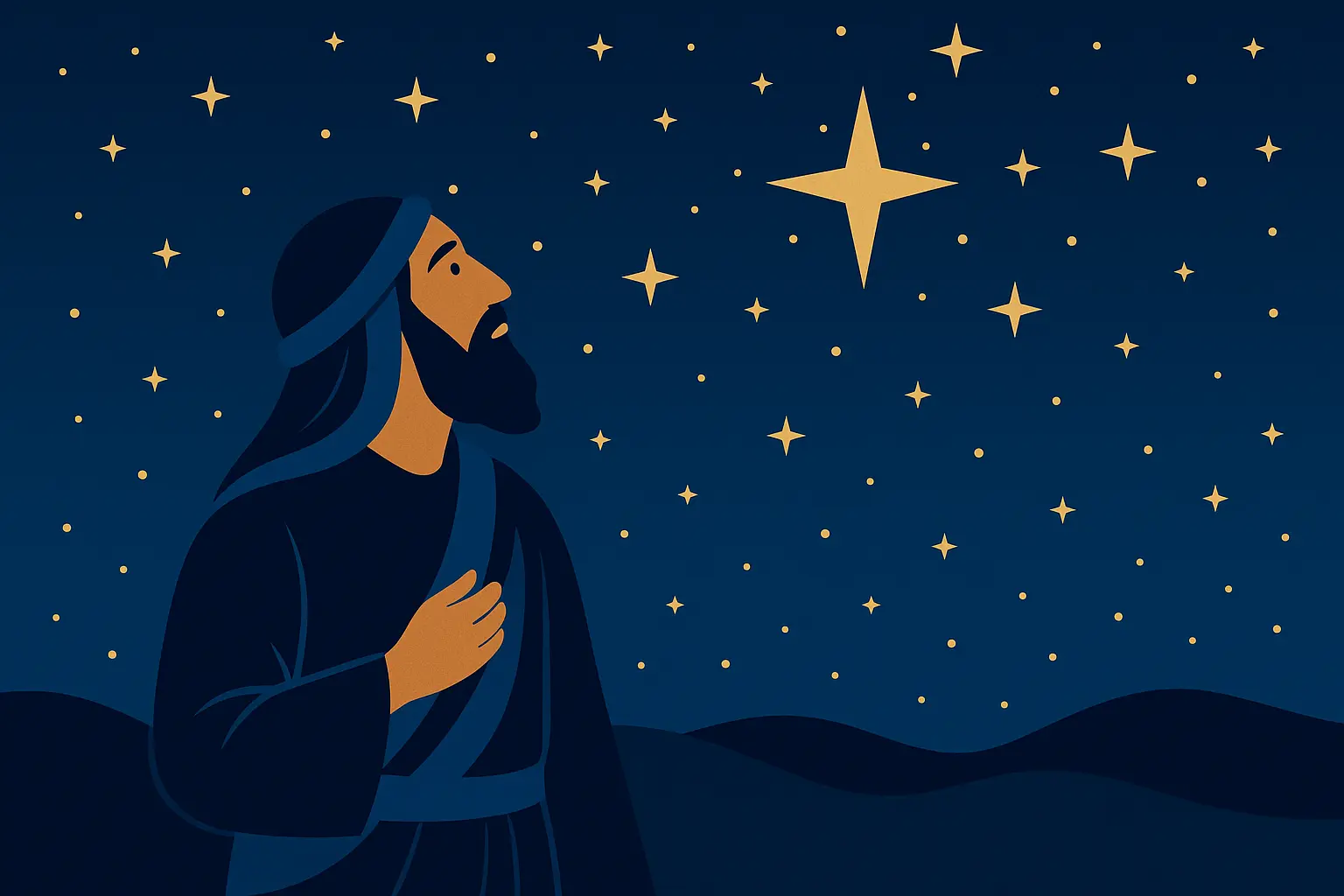
6. Abraham’s Call and Journey (Genesis 12)
Abraham’s call represents every major life transition that requires leaving the familiar for the unknown. God basically said, “Pack up and go to the place I’ll show you” – no GPS coordinates, no timeline, no detailed business plan. Just a promise and a direction.
This story speaks to anyone facing career changes, relocations, starting new ventures, or any situation where you have to act on vision before you can see the complete picture. I know people who’ve left stable jobs to start nonprofits, moved across the country for love, or changed careers at 40 because they finally figured out what they actually wanted to do. Abraham’s willingness to leave family, culture, and security demonstrates the kind of faith that doesn’t just change individuals – it transforms entire civilizations.
7. Abraham and Isaac (Genesis 22)
Look, I’m not going to pretend I have all the answers about this story. Half the time I read about Abraham almost sacrificing Isaac and think, “What kind of test is that?” But that’s exactly why this story works – it doesn’t give us easy answers wrapped in a neat bow.
This narrative pushes faith to its absolute limit. Abraham’s willingness to sacrifice Isaac – the son through whom all of God’s promises were supposed to be fulfilled – creates one of the most challenging stories in all of literature. It operates on multiple levels: literal obedience, theological exploration of sacrifice, psychological examination of ultimate trust, and ethical questions about moral absolutes. Modern readers struggle with the apparent conflict between divine command and moral intuition, which makes this story particularly relevant for exploring the relationship between faith and ethics.
8. Jacob’s Ladder (Genesis 28)
Jacob’s ladder vision comes at a crucial transition point – he’s literally running for his life after stealing his brother’s birthright. The dream of angels moving between heaven and earth reveals divine presence right in the middle of personal crisis and uncertainty.
The story addresses those spiritual experiences that happen during difficult transitions, the reality of divine guidance, and how crisis can become opportunity for spiritual growth. I think about this story during career transitions, major life changes, or those moments when you’re not sure what comes next but somehow sense that something bigger is at work.
9. Joseph and His Brothers (Genesis 37, 39-50)
Think about the last time someone took credit for your work at the office. That burning feeling in your chest? That’s exactly what Joseph felt when his brothers threw him in a pit and sold him into slavery. The difference is what he did with that anger.
Joseph’s story spans decades and shows how character develops through adversity. Sold into slavery by jealous brothers, falsely imprisoned, forgotten by people he helped – Joseph eventually rises to become second-in-command of Egypt and saves his family from famine. But here’s the kicker: when he finally has the power to get revenge, he chooses forgiveness instead.
This narrative demonstrates how powerful anecdote examples can illustrate profound truths about forgiveness, providence, and character development through multiple interconnected episodes.
I know a guy who got passed over for promotion three times while watching less qualified people get ahead. He could’ve gone the Cain route – bitter, angry, blaming everyone else. Instead, he pulled a Joseph – kept working with integrity, and eventually started his own company. Now he employs some of those same people who got promoted ahead of him.
The story addresses workplace betrayal, family dysfunction, false accusations, forgotten promises, and the choice between revenge and forgiveness. Joseph’s decision to reveal his identity to his brothers and provide for them rather than seek revenge demonstrates mature leadership and the power of forgiveness to transform relationships.
10. Jacob Wrestling with God (Genesis 32)
Jacob’s wrestling match happens as he’s preparing to face his brother Esau after years of separation following that whole birthright theft situation. This mysterious figure wrestles with him all night, refuses to give his name, but gives Jacob a new identity – Israel, “he who wrestles with God.”
This story speaks to spiritual struggle, identity transformation, and the process of personal growth through difficulty. The wrestling represents active engagement with spiritual questions rather than passive acceptance, showing how divine blessing often comes through struggle rather than easy answers. Sometimes you have to fight for who you’re becoming.
Liberation and Law: Freedom and Responsibility
Here’s what I’ve learned: freedom isn’t just about escaping bad situations – it’s about accepting responsibility for how you use that freedom. These stories show the connection between liberation and accountability, deliverance and duty.
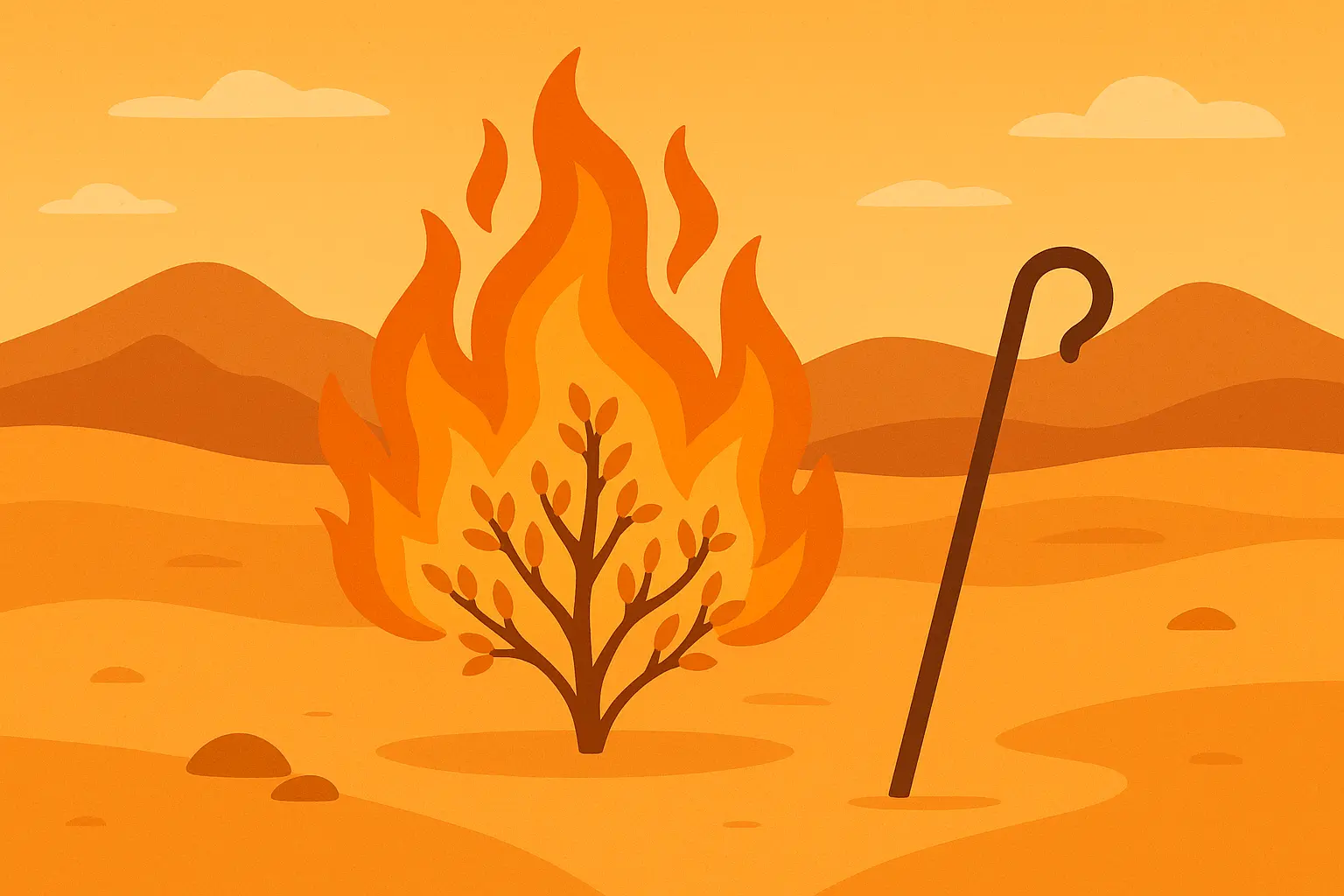
11. Moses and the Burning Bush (Exodus 3)
Moses encounters God while working as a shepherd – a far cry from his earlier life as Egyptian royalty. The burning bush that doesn’t get consumed represents divine presence that transforms without destroying, while Moses’ reluctance shows how calling often meets serious resistance.
Moses offers five excuses that sound incredibly familiar: “Who am I?” (imposter syndrome), “Who should I say sent me?” (authority issues), “What if they don’t believe me?” (credibility concerns), “I’m not a good speaker” (ability doubts), and “Please send someone else” (straight-up avoidance). These objections mirror modern resistance to leadership opportunities, career changes, or accepting responsibility for difficult situations.
12. The Exodus and Red Sea Crossing (Exodus 14)
The Red Sea crossing happens when Israel faces impossible circumstances – Egyptian army behind them, impassable water ahead, nowhere to run. The dramatic deliverance comes precisely when human options are completely exhausted, demonstrating divine power and perfect timing.
This story speaks to anyone trying to escape toxic work environments, leave abusive relationships, overcome financial crises, or any situation where you feel trapped with no apparent options. The story shows how breakthrough often comes when circumstances appear most hopeless.
13. The Ten Commandments (Exodus 20)
The Ten Commandments aren’t just religious rules – they’re foundational principles for any functional society. The first four address your relationship with the divine, while the last six govern human relationships, creating a framework that has influenced legal systems worldwide.
Here’s how they break down in everyday terms:
Worship & Priorities – Don’t let career, money, or status become your god
Truth in Communication – Your word should mean something
Rest & Rhythm – Work-life balance isn’t optional
Family Relations – Take care of your aging parents
Life & Safety – Violence isn’t the answer
Marriage & Commitment – Keep your promises
Property & Justice – Respect other people’s stuff
Truth & Integrity – Don’t lie about people
Contentment – Stop wanting what everyone else has
These principles address fundamental human needs and social structures. They’re not arbitrary rules but practical guidelines for building communities where people can actually trust each other and thrive.
14. The Golden Calf (Exodus 32)
The golden calf incident happens while Moses is up on Mount Sinai getting the law. The people grow impatient with his absence and pressure Aaron to create a visible god they can worship, resulting in the construction of a golden calf and wild celebration.
The story addresses leadership challenges during crisis, peer pressure to compromise principles, the human tendency toward wanting visible rather than invisible faith, and how quickly groups can abandon their stated values when circumstances become difficult. Aaron’s weak leadership contrasts sharply with Moses’ decisive response when he returns.
Conquest and Judges: Leadership Under Pressure
Leadership during crisis requires completely different skills than leadership during good times. These stories show how effective leaders adapt their strategies to impossible circumstances and how personal integrity affects everyone around them.
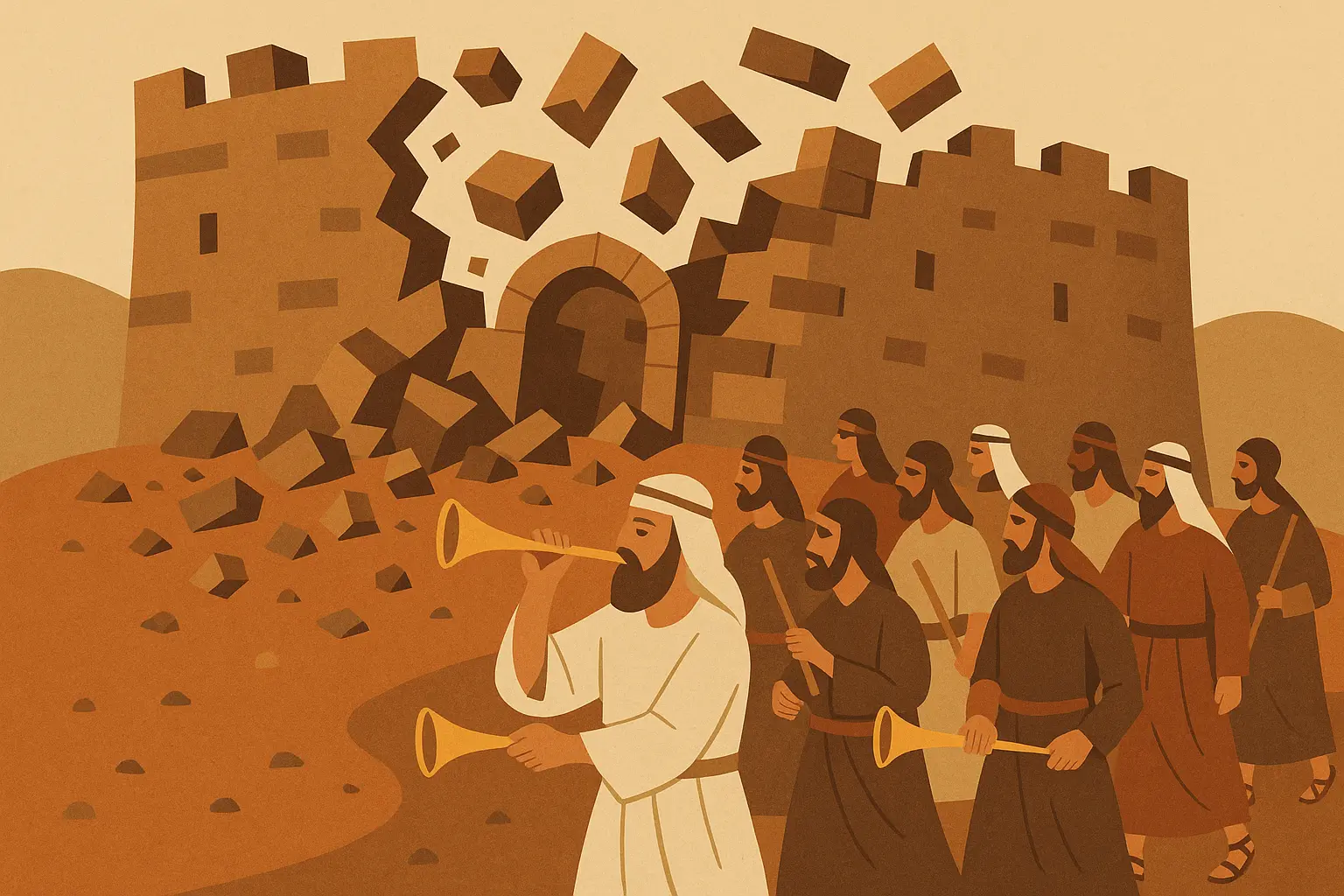
15. The Battle of Jericho (Joshua 6)
Jericho’s walls fall through marching and trumpet blasts rather than siege warfare or military assault. From a military perspective, the strategy seems completely ridiculous, but it demonstrates how unconventional approaches can succeed where traditional methods fail.
I think about this story whenever I see startups disrupting entire industries with creative approaches, or when someone solves a longstanding problem by thinking completely outside the box. The story also addresses persistence (seven days of marching around the city) and following instructions precisely even when they seem to make no sense.
16. Gideon’s Army (Judges 7)
Gideon starts with 32,000 volunteers, but God systematically reduces the army to 300 men to ensure that victory clearly comes through strategy and divine power rather than brute force. The final battle uses torches, trumpets, and clay jars rather than conventional weapons.
This story speaks to anyone building effective small teams, startup strategies with limited resources, or overcoming resource limitations through creative thinking. Gideon’s initial fear and doubt also show how effective leaders can emerge from the most unlikely candidates – sometimes the person who’s scared but willing is better than the person who’s confident but unprepared.
17. Samson and Delilah (Judges 16)
Samson’s supernatural strength makes him Israel’s most powerful judge, but his weakness for women – particularly Delilah – leads to his downfall. Despite three previous attempts to discover his secret, Samson eventually reveals that his strength comes from his uncut hair.
The story addresses how workplace relationships can compromise professional effectiveness, the danger of revealing sensitive information to untrustworthy people, how repeated exposure to temptation can gradually weaken your resistance, and the consequences of mixing personal desires with public responsibilities. It’s a cautionary tale about how personal weaknesses can undermine professional strengths.
Kings and Prophets: Power and Accountability
Here’s what’s crazy about power: it doesn’t create character, it reveals it. These stories show how authority amplifies whatever’s already there and how accountability systems must function to prevent corruption and abuse.
18. David and Goliath (1 Samuel 17)
David’s victory over Goliath happens when Israel’s entire army is paralyzed by fear of this giant. David’s confidence comes from previous experience (he’d killed lions and bears while protecting sheep), proper equipment (sling and stones rather than unfamiliar armor), and faith that right would triumph over might.
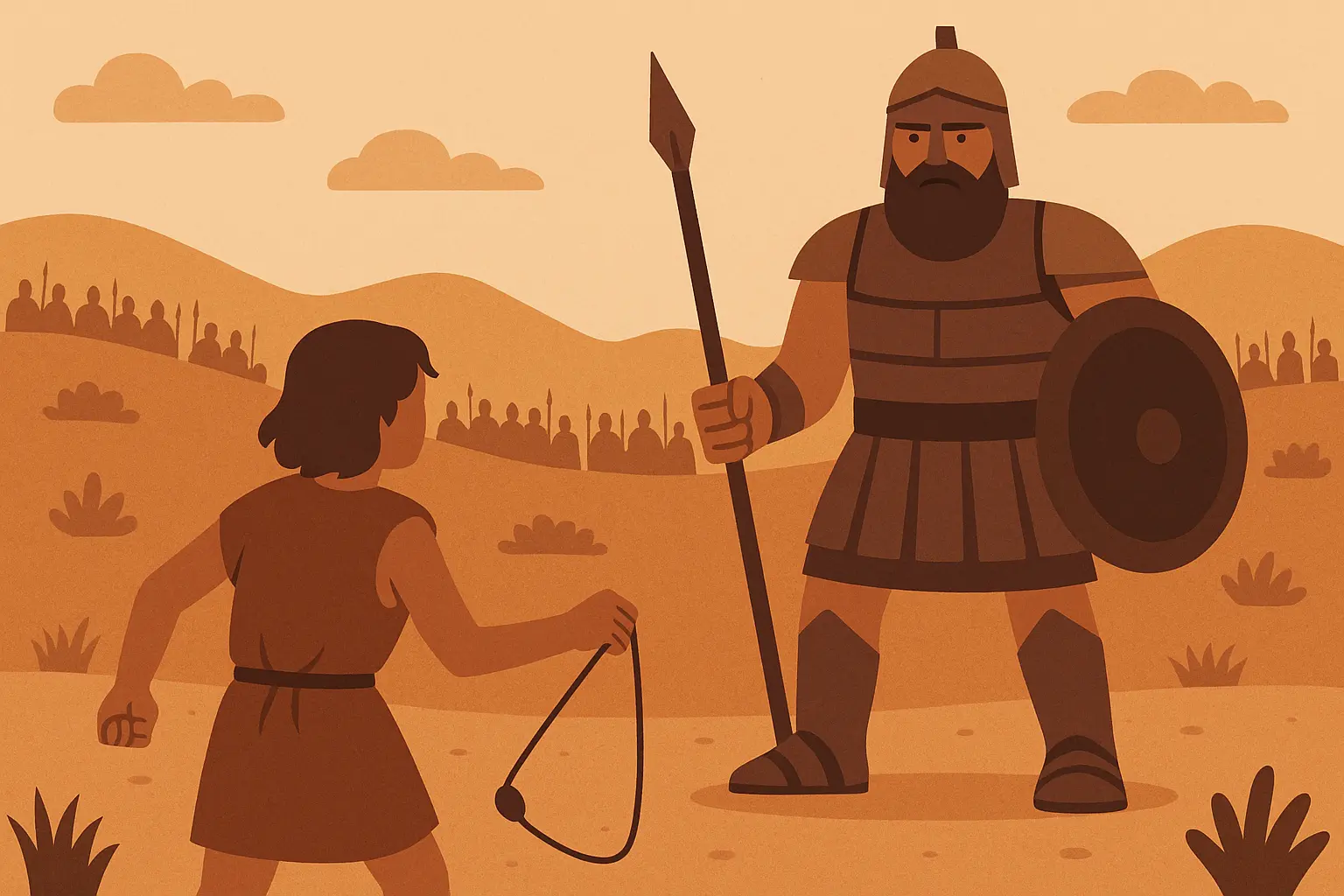
This story applies to standing up to workplace bullies, facing overwhelming business competition, confronting systemic injustices, and any situation where you’re significantly outmatched but know you’re right. The key lessons: use your natural skills rather than copying others’ methods, prepare through smaller challenges, and let moral conviction be your source of strength.
19. David and Bathsheba (2 Samuel 11-12)
David’s abuse of power begins with seeing Bathsheba bathing and escalates through adultery, attempted cover-up, and finally ordering her husband Uriah’s death in battle. The prophet Nathan confronts David through a parable about a rich man stealing a poor man’s lamb, leading to David’s recognition of his guilt.
This story directly addresses sexual misconduct by leaders, abuse of power, attempted cover-ups, and the courage required to speak truth to authority. Nathan’s approach demonstrates how to deliver difficult messages to powerful people through storytelling and strategic timing rather than direct confrontation.
20. Solomon’s Wisdom (1 Kings 3)
Solomon’s request for wisdom to govern well rather than personal gain impresses God, who grants both wisdom and the wealth and honor Solomon didn’t ask for. The famous judgment involving two women claiming the same baby demonstrates practical wisdom in action.
The story addresses leadership priorities, creative conflict resolution, the importance of asking for the right things, and how wisdom in one area often leads to success in others. Solomon’s approach to the baby dispute shows how understanding human nature enables effective problem-solving.
21. Elijah and the Prophets of Baal (1 Kings 18)
Elijah challenges 450 prophets of Baal to a contest – each side prepares a sacrifice and calls on their god to send fire. After Baal’s prophets fail despite hours of effort, Elijah soaks his sacrifice with water three times before God sends fire that consumes everything.
Consider Dr. Ignaz Semmelweis, the Hungarian physician who in the 1840s insisted that doctors wash their hands before delivering babies. Despite overwhelming evidence that handwashing reduced mortality rates from 18% to less than 2%, the medical establishment ridiculed and rejected him. Semmelweis stood alone against popular opinion with demonstrable truth. Though he died in obscurity, his ideas eventually revolutionized medicine and saved countless lives.
This story addresses standing for truth against popular opinion, confronting false systems with demonstrated evidence, and the courage required to challenge established but corrupt practices. Elijah’s confidence comes from previous experience with God’s faithfulness rather than presumption.
Exile and Restoration: Hope in Dark Times
Dark times don’t just test your character – they reveal its depth. These stories show how to maintain integrity when systems are hostile and how individual courage can protect entire communities.
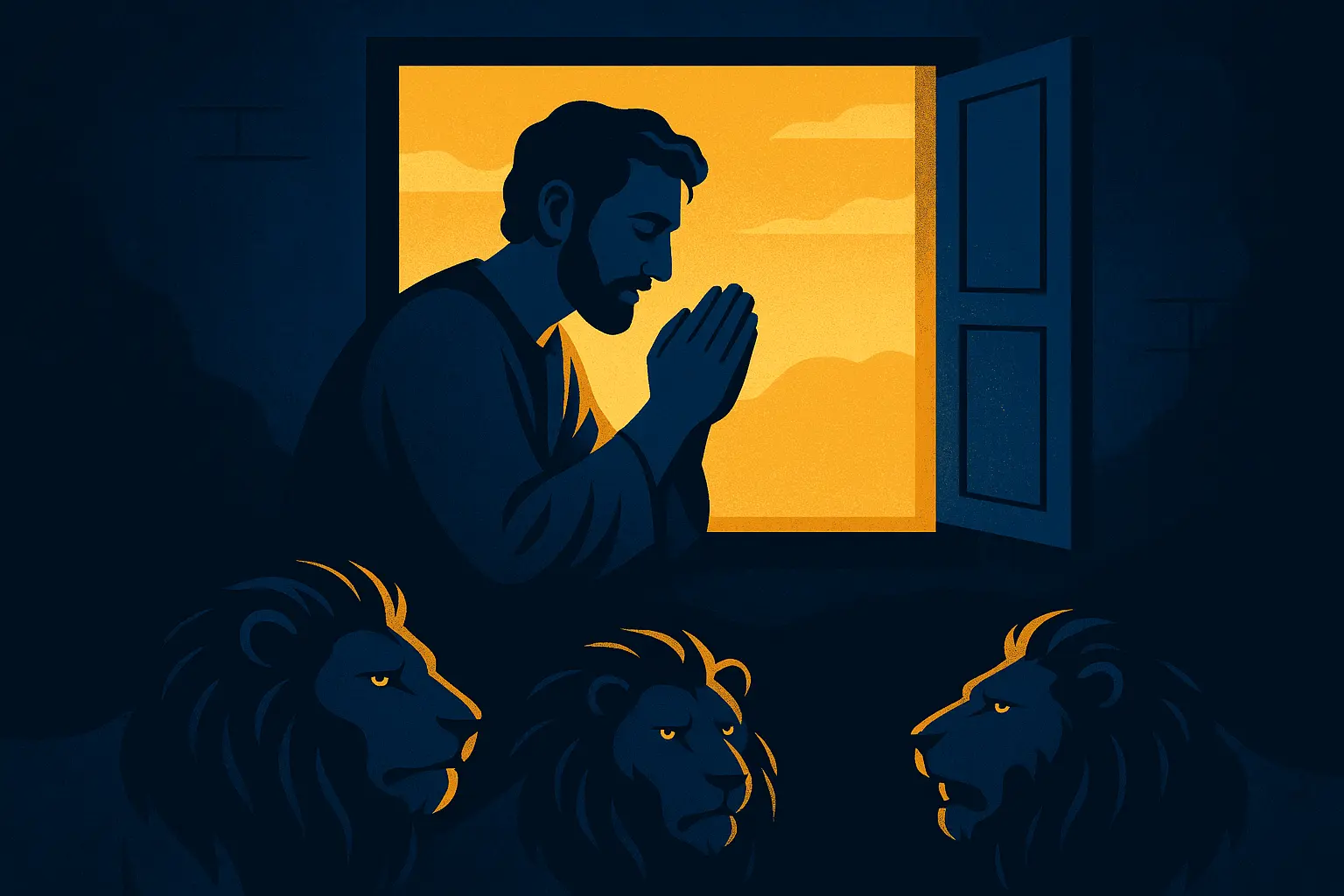
22. Daniel in the Lion’s Den (Daniel 6)
Daniel’s commitment to prayer three times daily continues even after King Darius signs a law forbidding prayer to anyone except the king. Despite knowing the consequences (being thrown to lions), Daniel maintains his practice, leading to his miraculous protection and the king’s eventual conversion.
This story addresses workplace integrity when company policies conflict with personal values, religious freedom under hostile governments, civil disobedience when laws contradict conscience, and how personal faithfulness can influence broader systems. Daniel’s approach demonstrates quiet consistency rather than dramatic confrontation.
23. The Fiery Furnace (Daniel 3)
The three young men refuse to bow to Nebuchadnezzar’s golden image despite the threat of being thrown into a fiery furnace. Their response – “Our God can deliver us, but even if he doesn’t, we still won’t worship your image” – demonstrates faith that doesn’t depend on guaranteed outcomes.
This story applies to standing for principles when career advancement is threatened, maintaining ethical standards when competitors use questionable practices, and religious freedom in secular environments. It shows how group solidarity can strengthen individual courage and how sometimes you have to be willing to lose everything to keep your integrity.
24. Jonah and the Great Fish (Jonah 1-4)
I used to think Jonah was just being dramatic about the whole whale thing. Then I got asked to give feedback to my boss’s boss about some serious problems, and suddenly I understood the appeal of running away to sea.
Jonah’s attempt to flee from God’s command to preach to Nineveh results in a storm, being thrown overboard, and spending three days in a great fish. After his rescue, Jonah reluctantly obeys but becomes angry when Nineveh repents and God shows mercy.
The story addresses reluctant service, second chances after failure, overcoming prejudice against groups you dislike, and how divine compassion often extends beyond human expectations. Jonah’s anger at God’s mercy reveals how personal biases can conflict with larger purposes.
25. Esther Saves Her People (Esther 1-10)
Esther’s position as queen gives her unique access to King Ahasuerus, but revealing her Jewish identity and exposing Haman’s genocidal plot requires careful strategy and perfect timing. Her approach through banquets and strategic revelation demonstrates political wisdom combined with moral courage.
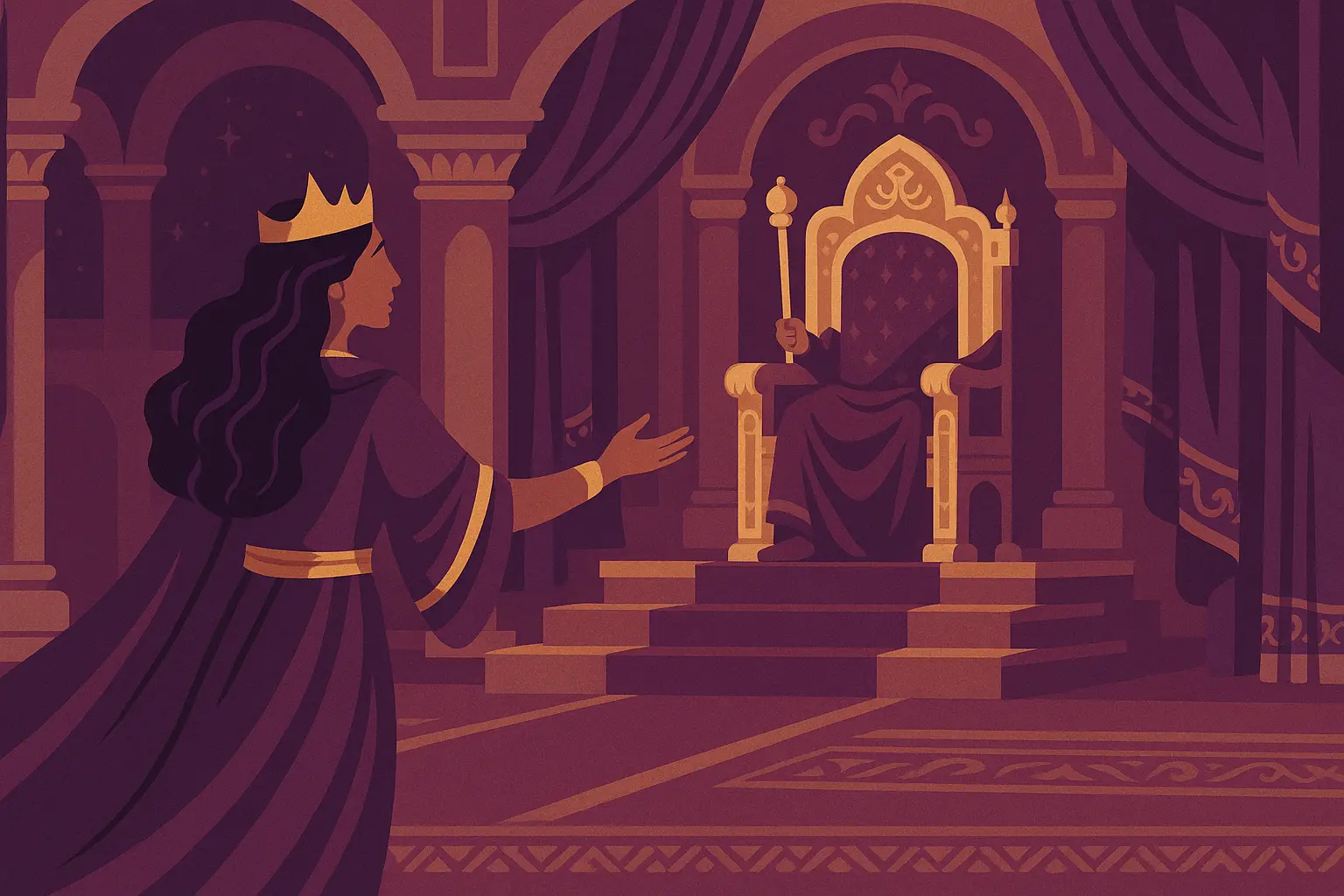
This story addresses corporate whistleblowing, protecting vulnerable populations, strategic communication in crisis situations, and how individual courage can save entire communities. Esther’s approach shows how to work within systems while challenging injustice.
Simple Stories vs. Complex Narratives: What Works When
Not every story requires the same level of brain power. Some give you immediate practical guidance, while others reward extended study with deeper insights into human nature and how the divine works in the world.
Just as short story examples demonstrate different levels of narrative complexity, Old Testament accounts range from simple moral tales to intricate multi-generational sagas.
Simple Stories with Clear Takeaways work best when you need immediate practical guidance or you’re working with people new to this stuff. David and Goliath provides a straightforward lesson about courage overcoming overwhelming odds. Daniel in the lion’s den demonstrates integrity under pressure with clear applications to workplace situations.
These stories typically have obvious good guys and bad guys, clear moral lessons, and direct applications to contemporary situations. They work well for motivation, teaching basic principles, or providing encouragement during tough times.
Complex Stories That Make You Think reward extended study with sophisticated insights into human psychology, ethical decision-making, and the relationship between divine sovereignty and human responsibility. Joseph’s journey with his brothers operates on multiple levels – family dysfunction, providence through suffering, forgiveness versus justice, and leadership development through adversity.
Abraham’s willingness to sacrifice Isaac challenges readers with questions about faith versus ethics, divine command versus moral intuition, and the nature of ultimate obedience. These stories don’t provide easy answers but encourage wrestling with fundamental questions about meaning, morality, and divine interaction.
Match Your Purpose – If you’re seeking immediate practical guidance for a specific situation, focus on stories with clear applications. If you’re exploring deeper questions about faith, ethics, or human nature, invest time in complex narratives that reward extended reflection.
Consider Your Audience – New learners benefit from straightforward stories with obvious lessons, while experienced students can handle the ambiguity and complexity of multi-layered narratives. Group discussions work well with stories that offer multiple valid interpretations, while individual study can tackle the most challenging texts.
Real-World Applications for Modern Life
These ancient stories address contemporary challenges because human nature hasn’t changed. The contexts are different, but the underlying issues of leadership, integrity, relationships, and moral choice remain exactly the same.
Workplace Stuff shows up throughout these narratives. Daniel’s integrity in hostile political environments translates directly to maintaining ethical standards in competitive business settings. Joseph’s rise from slavery to leadership demonstrates how character development through adversity prepares you for greater responsibilities.
David and Bathsheba’s story addresses abuse of power, sexual misconduct by leaders, and the importance of accountability systems. Gideon’s army shows how small teams with good strategy can outperform large organizations with poor leadership.
Family Drama emerges from stories like Cain and Abel (sibling rivalry), Joseph and his brothers (favoritism and forgiveness), and Jacob’s wrestling (identity transformation). These narratives show how family dysfunction patterns repeat across generations but can be broken through forgiveness and personal growth.
Leadership Lessons run through most of these stories. Moses’ reluctance at the burning bush mirrors modern imposter syndrome and resistance to leadership opportunities. Solomon’s request for wisdom demonstrates proper leadership priorities, while his later failures show how success can lead to moral compromise.
Crisis Management appears in stories like Noah’s preparation for the flood, Esther’s strategic approach to saving her people, and the Israelites’ escape through the Red Sea. These narratives show how to prepare for disasters, communicate during crises, and maintain hope when circumstances appear hopeless.
Making Tough Decisions frameworks emerge from complex stories that present moral dilemmas without easy answers. Abraham’s willingness to sacrifice Isaac raises questions about competing moral obligations. Jonah’s reluctance to preach to Nineveh explores how personal prejudices can conflict with larger purposes.
Personal Growth applications include Jacob’s identity transformation through wrestling with God, David’s repentance after Nathan’s confrontation, and Joseph’s choice to forgive rather than seek revenge. These stories show how character develops through struggle and how personal choices affect broader communities.
How Nairrate Can Help You Create Your Own Powerful Stories
These Old Testament stories prove that the most enduring narratives combine universal themes with specific, concrete details – exactly what effective modern storytelling requires. Whether you’re exploring leadership themes like Moses and David, transformation like Jacob, or courage like Esther and Daniel, these ancient narratives provide proven templates for compelling storytelling.
Nairrate’s AI story generation tools can help you apply these time-tested narrative patterns to contemporary settings. The Story Starters Generator can provide opening lines that capture the dramatic tension found in stories like David facing Goliath or Esther approaching the king uninvited. The Story Prompt Generator can suggest modern scenarios that explore the same deep themes of faith, courage, and moral choice that make these biblical narratives timeless.
Just as these stories work on multiple levels – literal, symbolic, and universal – your own narratives can achieve similar depth by understanding how character, conflict, and resolution create meaning that resonates across cultures and centuries.
Final Thoughts
Look, I’m not saying these 25 Old Testament stories will solve all your problems or that reading about Moses will make you ready to lead a revolution. But I will say this – every time I think I’m facing something completely new and impossible, I remember that people have been dealing with the same basic human stuff for thousands of years. And somehow, that makes it feel a little less impossible.
These stories have shaped human understanding of leadership, morality, and purpose for thousands of years because they address fundamental questions every person faces: How do I respond when life calls me to something bigger? What do I do when power starts corrupting me or others? How do I maintain integrity when everyone around me is compromising? When should I forgive, and when should I seek justice?
The stories range from simple moral lessons to complex multi-layered narratives, but they all share common elements that make them enduringly relevant. They present real people facing impossible circumstances, making difficult choices, and dealing with consequences – both intended and completely unexpected. They show how individual decisions affect entire communities and how character develops through struggle rather than comfort.
Whether you’re drawn to the straightforward courage of David facing Goliath or the complex family dynamics of Joseph forgiving his brothers, these narratives offer practical wisdom for contemporary challenges. They demonstrate that the most profound truths often emerge from the messiest human situations and that hope can survive even the darkest circumstances.
The key to applying these stories effectively is recognizing the universal themes within specific ancient contexts. Human nature hasn’t changed – we still struggle with jealousy like Cain, face overwhelming odds like David, wrestle with identity like Jacob, and must choose between revenge and forgiveness like Joseph. These stories provide both mirror and map: they show us who we are and point toward who we might become.



Add comment